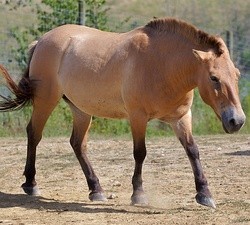Last week, we reported that a Missouri horse slaughter facility may get the green light from federal officials who say they are legally required to approve the processing plant if it meets a series of requirements.
Animal rights advocates argue the practice is cruel and that horse meat is dangerous for human consumption -- and now the U.S. Humane Society is hoping to block horse slaughter altogether with a lawsuit against the U.S. Department of Agriculture.
"We feel...the USDA did not do proper inspections or evaluations of the environmental impacts that this plant is going to have," Amanda Good, Missouri state director for the U.S. Humane Society, tells Daily RFT, adding, "There's just some really, really inhumane practices that go into horse slaughter."
See also: - Horse Slaughter In Missouri? ASPCA Slams Cruel Practice - Humane Society: Missouri Still Has Nation's Worst Puppy Mills - Photos: Animal Cruelty in Missouri and Rescues from Abuse
The lawsuit targets the USDA inspections and reviews of horse processing plants in New Mexico, Iowa and Missouri.

In Missouri, a Gallatin-based business called Rains Natural Meats, has applied for federal approval for horse slaughter, a practice which was banned by Congress seven years ago. The restriction, however was not renewed in 2012 laws.
That means for the first time since 2006, facilities in the U.S. may once again slaughter horses for human consumption -- which would generally happen overseas.
Officials with the USDA's Food Safety and Inspection Service (FSIS) say they can't deny these interested businesses.
"As long as they meet all the guidelines, there's nothing to stop them from approving," Good says.
But her organization is alleging in a complaint that names several key USDA officials that the federal agency is "embarking on a nationwide program of horse slaughter that presents clear threats to the environment without complying with Congressionally-mandated requirements intended to protect the public and our natural resources."
The slaughter of American horses for human consumption, the lawsuit alleges, "presents unique and extensive dangers that have never been adequately considered by [the USDA], despite their obligations under [the National Environmental Policy Act]."
If a judge ruled in favor of the Humane Society (which has several co-plaintiffs, including other animal rights groups), it would block the horse processing plants in all three states, Good explains.
And in the meantime, the legal action has delayed horse slaughter inspections for weeks.

The argument is that the USDA is going forward with horse slaughter inspections before complying with federally mandated environmental review obligations.
Good and other animal rights groups point to the negative impacts a horse slaughter plant had on a town in Texas.
"There were limbs ending up in people's yards," Good says.
Blood from the slaughters can cause problems for local municipalities as well, she says..
And officials with the American Society for the Prevention of Cruelty to Animals told us last week that horse slaughter plants hurt local economies, because of harmful environmental impacts, such as terrible stenches and damaged sewage systems.
Continue for more from the Humane Society and a copy of the lawsuit.






